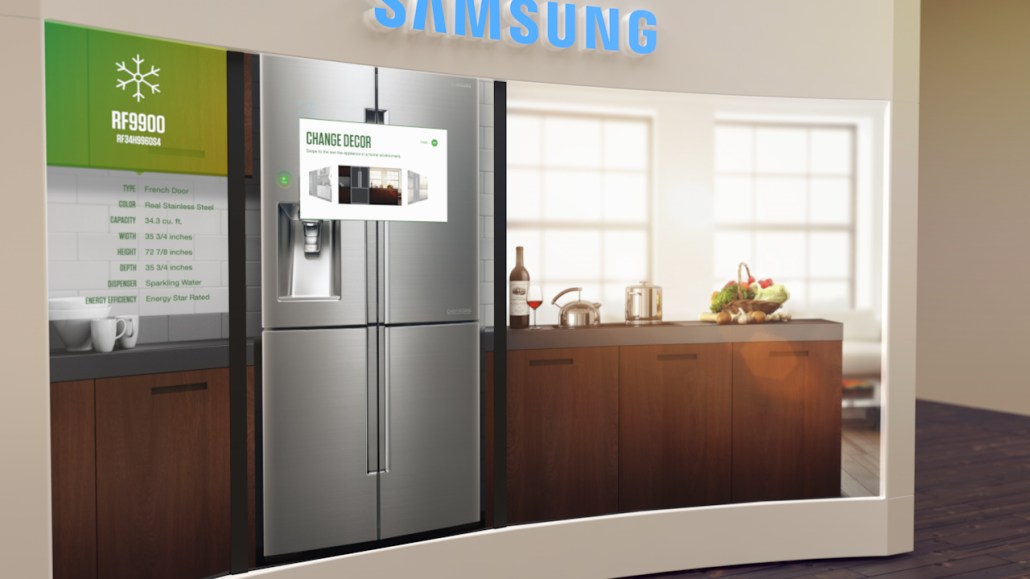Secure your place at the Digiday Publishing Summit in Vail, March 23-25

How do you buy a fridge?
Often, it’s a case of blind leading the blind. You walk into a show room, read the spec cards alongside for hard-to-understand information about depths, refrigerants and insulation, and hope for the best.
Samsung is hoping to turn shopping for a refrigerator — or dishwasher, washing-machine or microwave — into a more enjoyable, interactive experience with the help of CenterStage.
Created by The Barbarian Group using its Cannes Grand Prix-winning Cinder software, CenterStage is an 85-inch interactive 4K display that lets customers browse a product, filter their requirements, and then explore it to their hearts’ content. It’s the first large-scale brand use for the creative coding platform from Barbarian.
The brand said it will launch these with U.S. retailers in the summer.
“We prototyped with other tools and found we either had to sacrifice on image quality, user experience or motion design,” said Barbarian Group co-founder Keith Butters. “Using Cinder, we built a custom video playback engine and real time rendering pipeline to meet our resolution and frame rate requirements.”
“Samsung CenterStage delivers a vivid and immersive demonstration of what it is like to live with, use and experience products at retail,” said Sophie Kelly, CEO at The Barbarian Group. “Currently, they are either not plugged or available on the showroom floor. The interactive installation also provides consumers and salespeople with clearly defined information on every single aspect of the products, at their fingertips, all wrapped up in an entertaining brand experience.”
Of course, there are massive savings associated with showroom space rentals, inventory and even how many salespeople need to be on the floor.
The display, which is designed for “two audiences,” also lets shoppers do things they couldn’t do in stores, like run the washer to see how many “suds per minute” each has, or see how the dishwasher works. There’s also the option to access additional content, like videos or commercials, all through the display. Built-in analytics let the store — and Samsung — see customer browsing habits as well, while a “change decor” feature lets you see how the appliances look in actual homes. An infographic section on the right of the main image “dramatizes the point,” as Kelly puts it. Open up a refrigerator to see food inside, and get rewarded with details about how it helps keep food fresh, for example.
It’s basically a playground for home appliance nerds.
Here’s a demo:
And embed code:
Samsung CenterStage from The Barbarian Group on Vimeo.
Despite what e-commerce-pushing doomsday predictors say, brick-and-mortar stores have a bright future. A recent McKinsey report said that IRL shopping will account for approximately 85 percent of U.S. retail sales in 2025.
Samsung — whose appliance business equals roughly $12 billion a year — wants to be the world’s biggest seller of refrigerators, microwaves and dishwashers. The problem is that is currently is more recognized for its mobile and devices business, not for selling dishwashers — a perception it needs to overcome. Euromonitor figures show Samsung is the third-most popular appliance maker in the world, with about 4.1 percent market share in 2013. The number one player is China-based Haier Group.
Samsung’s growth strategy hinges on connectivity at a moment. The timing is certainly right: the International Data Corporation predicts the “Internet of Things” will be a $7.1 trillion industry by 2020.
At CES earlier this year, Samsung introduced a Smart Home project that let customers connect their appliances to the Internet and to their smartphones so they could control them from anywhere. It’s also done all it can to try and make its refrigerators and dishwashers stand out, with features that include sparkling water dispensers and a “Flex Tray” dishwasher feature that made it easier to unload silverware.
More in Marketing

‘The conversation has shifted’: The CFO moved upstream. Now agencies have to as well
One interesting side effect of marketing coming under greater scrutiny in the boardroom: CFOs are working more closely with agencies than ever before.

Why one brand reimbursed $10,000 to customers who paid its ‘Trump Tariff Surcharge’ last year
Sexual wellness company Dame is one of the first brands to proactively return money tied to President Donald Trump’s now-invalidated tariffs.

WTF is Meta’s Manus tool?
Meta added a new agentic AI tool to its Ads Manager in February. Buyers have been cautiously probing its potential use cases.







